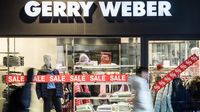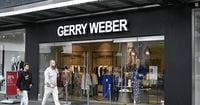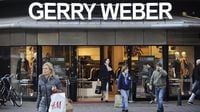The Dutch fashion chain Gerry Weber has been declared bankrupt by the court in Amsterdam on April 2, 2025, marking a significant downturn for the company that has been facing financial difficulties for some time. The bankruptcy comes after the company had already requested a suspension of payments earlier this week, indicating the severity of its financial situation.
According to curator Marc van Zanten, there is a "very real chance of a restart of the Dutch branch of the retail chain in the short term." This optimistic outlook is bolstered by the fact that all 38 stores in the Netherlands will remain open for the next six weeks, allowing for potential buyers to assess the business.
Gerry Weber, which operates in over sixty countries, has been struggling for several years. The German parent company has already been declared bankrupt and is undergoing multiple bankruptcy proceedings. This has had a ripple effect on its Dutch operations, leading to the current situation.
Despite the bankruptcy, Van Zanten is hopeful. He stated, "By keeping the stores open, the chance increases that Gerry Weber can continue to exist in the Netherlands." The curator emphasized that there are serious buyers interested in the Dutch branch, describing them as "large, serious, and well-known parties that operate in the same market." This interest is crucial as the debt load of Gerry Weber made a sale without bankruptcy impossible.
In total, Gerry Weber employs nearly 200 people across its stores and head office in the Netherlands. Although the employees have been dismissed, they are legally required to continue working for a notice period of six weeks, which allows them to remain in their positions while the company seeks a buyer.
Van Zanten expressed the importance of retaining knowledgeable staff, saying, "We have incredibly good and experienced personnel who know the customers of Gerry Weber. If we have to let them go, it would be a shame for the brand." Meanwhile, deliveries to wholesalers will continue, and Van Zanten expects that stock in the stores can still be replenished for the time being.
The company also has an online webshop, which is currently inactive as customers cannot place orders due to the German payment system being non-operational. This has further complicated the situation, as the online presence is often a vital part of retail operations.
Gerry Weber was founded in the early 1970s by German textile entrepreneur Gerhard Weber and a business partner. The company grew significantly during the 1980s, becoming an internationally listed retail chain for women's fashion. At its peak, Gerry Weber achieved a turnover of nearly one billion euros, a testament to its strong market presence.
However, the last decade has been challenging for the brand, leading to several drastic reorganizations. Many stores have closed, and thousands of jobs have been eliminated as the company struggled to adapt to changing market conditions. Notably, the Dutch branch had previously remained relatively unaffected compared to its German counterpart, which has faced more severe repercussions.
As the situation unfolds, the focus will be on whether a buyer can be found to take over the Dutch operations, allowing the brand to continue its legacy in the fashion industry. The coming weeks will be crucial in determining the future of Gerry Weber in the Netherlands.
With the bankruptcy proceedings underway, the fate of the 38 stores and their employees hangs in the balance. The hope is that a successful transition can take place, preserving jobs and maintaining the brand's presence in the competitive retail landscape.
As the fashion industry continues to evolve, Gerry Weber's experience serves as a reminder of the challenges faced by established brands in an increasingly digital and competitive marketplace. The outcome of this bankruptcy will not only impact the employees and customers but will also send ripples through the industry, highlighting the importance of adaptability and innovation for survival.
In conclusion, the future of Gerry Weber in the Netherlands remains uncertain, but with potential buyers showing interest and a commitment to keeping stores operational, there is a glimmer of hope for a successful restart.




